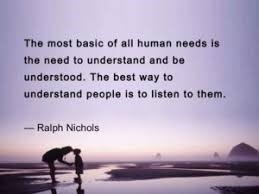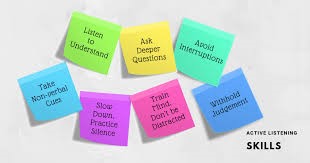- Home
- Leadership and Self Development
- Accountability as a Core Value
- Art of Listening
Mastering the Art of Listening with These Effective Steps
"When you understand the art of listening and can teach It, you can lead the wave of accountability and responsibility." Editors at AccountableCitizens.com
The art of listening is the most effective skill to bring about positive change. But just like any skill, there needs to be a commitment to do the work and a good reason to do it.
This will be a prequel to a follow-up page that will go deeper into this very important skill. Please check it out after you finish this page.

"People don't care what you know until they know that you care." Zig Ziglar
The Art Of Listening
There are a handful of values that will come from an honest effort to listen thoughtfully and try to understand. "Honest" is the operative word. People will see through a sham act at paying attention.
*Trust is built when we listen with the intent to hear and understand. Trust is important when building that initial team, and when we speak to people who are certain our viewpoint on life is way off base. Our first goal is to build trust of some kind and letting them speak is a good first step in developing the art of listening.
*Getting to the real issue of solving a conflict is another benefit of the art of listening. If it involves a team, listening will help us gauge whether we have a big problem to address right now or maybe just a personality clash that can be resolved with some patience and time. Listening for the real issue gives us a chance to offer a better solution. Maybe someone has had a bad personal experience and is transferring anger to every situation.
*Humility allows us to let people have their say without the need to interrupt or one up them. Maybe we don't know as much as we think we do and maybe we can learn something new by just listening with the intent to hear and understand.
*Better listening habits develops new leaders. That starts with the person in the mirror. We want our next generation to take leadership roles and grow in effectiveness. That means modeling leadership so they can follow the lead. If we are examples of active listening, our next generation of leaders will do the same and probably better.
*When we know how to improve listening skills, we don't miss important points. If we are learning from an expert, we want to pass on what we learn with accuracy and enthusiasm. If we are zoning out a little, we might miss something that could help us when we are in front of other people. That could mean bringing in new team members. It could mean saving a life. That's worth learning the art of listening.

Easy Steps To Becoming An Effective Listener
These steps aren't difficult to master the art of listening. They require some commitment, and some practice. Just like any good thing.
*This vital step is the most overlooked, so let's get it out there right away. Don't interrupt. Cutting someone off also cuts off any trust you might have established. It suggests we really don't care what the other person is saying. When someone interrupts the person in front of them it shows they have already decided that person is wrong. It also indicates an arrogance and lack of belief in the interrupter's opinion. He doesn't want to discuss the subject. He wants to head off answering any tough questions.
*This should be the most obvious step. Give the person speaking your complete attention. Ignore any distraction short of a full blown emergency. That means looking him in the eye and letting him know you want to hear his viewpoint and want to understand why he is feeling the way he feels about his topic. Just letting someone have their say and then following the next step can change hearts and then minds.
*Be present in the moment. Clear away anything from your mind that is outside what the person in front of you is saying. Maybe that means a few quiet moments with yourself before listening to her. When she finishes, ask her some clarifying questions. Not to trap her in her words. But rather, to let her know you didn't just hear her, you listened with the intent to hear and understand her. We've seen it happen where someone will give an emotional opinion and when we ask them some clarifying questions, they kind of rethink things when they hear themselves say it again.
This is where humility comes back in and we thank them for their obvious passion about caring for people. We aren't taking a victory lap. We're acknowledging that our differences aren't all that many and our similarities are more than we thought.
*This one takes a little practice. For me, it took lots of practice. Pay attention to body language. That will tell you in advance if the other person is rigidly locked into a position or may be open to another option. Are their arms crossed and are they leaning back in their chair? That often means they are geared for a fight. Chances are good they will be the ones to cut you off at every turn. Sometimes the best course is to just shut it down. This might be one of those times.
Are their hands folded or maybe they are leaning forward as they speak to you? This is often a good sign. They might be just as convinced of the "rightness" of their position as the previous example, but their body language suggests they are probably more likely to let you give your side.
All of this is really about the end goal. It isn't a competition. It's more important to do right than to be right. People who are hurting need help. They need to be heard and they need a compassionate voice to tell them we understand and want to help.
Listen with the intent to hear and understand and you will know how you can help.